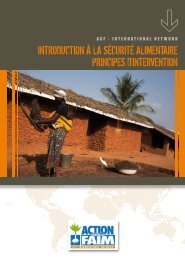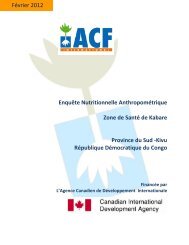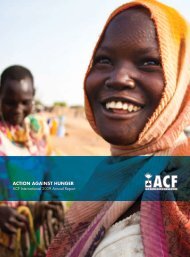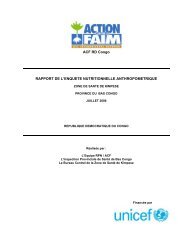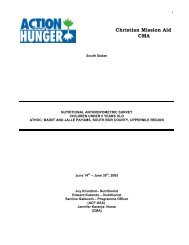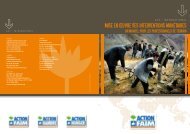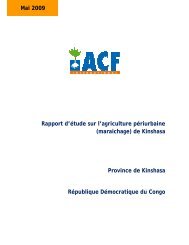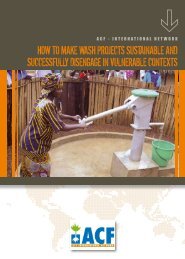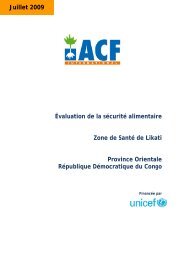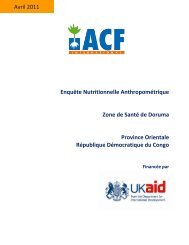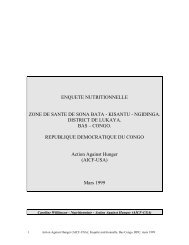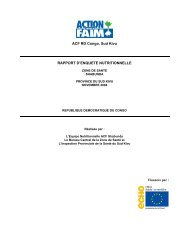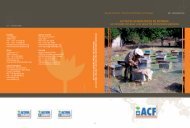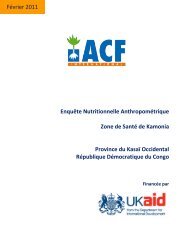Participatory Evaluation of our 2008 - Action Against Hunger
Participatory Evaluation of our 2008 - Action Against Hunger
Participatory Evaluation of our 2008 - Action Against Hunger
Create successful ePaper yourself
Turn your PDF publications into a flip-book with our unique Google optimized e-Paper software.
Executive Summary<br />
A. Synthesis<br />
This is an evaluation <strong>of</strong> the <strong>2008</strong> farmer field school (FFS) programme facilitated by <strong>Action</strong> <strong>Against</strong><br />
<strong>Hunger</strong> (ACF) in Uganda’s Lango sub-region. The programme was implemented from 1 January to<br />
31 July <strong>2008</strong> under a letter <strong>of</strong> agreement with the Food and Agriculture Organisation <strong>of</strong> the United<br />
Nations (FAO), who provided the cash and in-kind programme inputs.<br />
The evaluation brings together information from ACF and FAO, while at the same time <strong>of</strong>fering an<br />
applied learning opportunity to ACF staff participating as team members. It looks at the<br />
performance and impact <strong>of</strong> the FFS programme according to indicators created for the evaluation.<br />
The performance analysis covers production practices, increased production, and capacity for<br />
asset generation and management. The impact analysis investigates whether short term<br />
accomplishments in the programme have influenced the food security and livelihoods <strong>of</strong> participant<br />
groups and their individual households.<br />
Programme performance was good overall, with a range <strong>of</strong> planned and unanticipated<br />
accomplishments in relation to the FFS groups. A longer intervention with better planning and<br />
monitoring would have increased the strength <strong>of</strong> the accomplishments. Not much can be proved at<br />
impact level, however, given the short programme duration. The evaluation team is nonetheless<br />
convinced that benefits will continue accruing to FFS participants even now that the programme is<br />
finished, especially in terms <strong>of</strong> practices affecting production fav<strong>our</strong>ably and increased access to<br />
cash and credit.<br />
This executive summary outlines the key findings <strong>of</strong> the evaluation according to thematic focus.<br />
Conclusions are drawn from the findings, and are followed by a set <strong>of</strong> recommendations with<br />
supporting explanation. The report body begins with a general outline <strong>of</strong> the location and context <strong>of</strong><br />
the <strong>2008</strong> FFS programme. The evaluation objectives, methodology, and limitations are discussed<br />
before the remainder <strong>of</strong> the document addresses each indicator separately.<br />
B. Key Findings<br />
Improved Production Practices<br />
1. Promoted production practices appear to have been widely adopted by individuals convinced <strong>of</strong><br />
the benefits they can bring, and have been transferred from the farmer field school gardens to<br />
individual cultivation. These practices revolve primarily around land preparation, seed selection,<br />
planting, weeding, and pest control – all <strong>of</strong> which were implemented according to the seasonal<br />
calendar.<br />
2. Transmission <strong>of</strong> production practices to neighb<strong>our</strong>s and surrounding communities is reported in<br />
all locations but could not be verified as crops were not standing at the time <strong>of</strong> evaluation.<br />
Greater transmission could nonetheless be fostered through additional community activities at<br />
the commercial and study garden sites.<br />
3. Adoption <strong>of</strong> promoted documentation practices is not nearly as widespread as the production<br />
practices, especially for more complex tools like the pr<strong>of</strong>itability analysis, budget, and work plan<br />
which remain challenging even at group level.<br />
4. Literacy is an obstacle to adopting the documentation practices promoted in the programme,<br />
affecting their feasibility at group and individual levels, especially for women.<br />
5. Study and commercial gardens are appropriate and effective media for achieving programme<br />
objectives and ethos, and help advertise programme messages more widely than among<br />
participants alone.<br />
6. The study gardens nonetheless could be utilised even more effectively to enc<strong>our</strong>age greater<br />
farmer participation and experimentation.<br />
<strong>Action</strong> <strong>Against</strong> <strong>Hunger</strong> Uganda - 5 - Farmer Field School <strong>Evaluation</strong>



